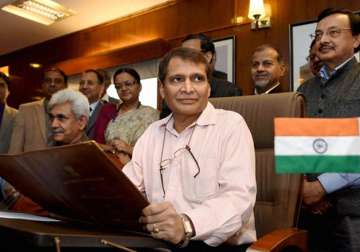Starting next financial year, there will be no separate Rail Budget. It is believed that the Ministry of Finance has agreed to the suggestions of Bibek Debroy (Member, NITI Aayog) panel, which among other things, had suggested phasing out separate Rail Budget.
According to a Times of India report, which quoted sources as saying, the Finance Ministry has constituted a five-member committee of officers to work out the modalities for the exercise.
The Debroy panel had recommended that the British-era legacy of having a separate Rail Budget should be phased out and it should be merged with General Budget.
The move is significant as political heavyweights, especially after coalition governments post 1996, have used the Rail Budget to hand out goodies and for their own image building.
Once the Rail Budget is merged with the General Budget, the Indian Railways will be like any other government department that receives budgetary support from the Finance Ministry.
On Tuesday, Railways Minister Suresh Prabhu had told the Rajya Sabha that the Rail Budget should be merged with the General Budget for the long term interest of national transporter as well as the country's economy.
Prabhu said that he had written to Finance Minister Arun Jaitley in this regard.
“As far as Railway Budget is concerned... I have written a letter personally to the Finance Minister saying we are willing for merger (of Railway Budget with the General Budget). In fact, I had suggested even last year. So it's not that I want to just present a budget. I am looking at a national interest,” he had said.
The merger should happen in such a way that Railways become a part of overall Budget and the capex, revenue deficit all of this can be taken care of, Prabhu said.
Indian Railways has the potential to contribute around 2-2.5 per cent of the GDP but for that it needs investment, he said, adding that the national transporter require huge investment for its survival as the department has a huge burden of 7th Pay Commission of about Rs 30,000-40,000 crore alone being the largest employer in addition to the subsidy burden of Rs 34,000 crore.
Indian Railways has one of the largest railway networks of the world and is the largest employer in the country. Every year, a Rail Budget, separate from the Union Budget is presented in the Parliament few days before the General Budget.
A separate budget for rail started in 1924 during the British rule. Indian Railways was considered a great asset of that time so a separate budget made sense, but as the Indian economy grew exponentially, the Rail Budget seemed quite smaller than the main budget. But the government has not yet abolished the separate budget for Indian Railways.
Critics have questioned the relevancy of a separate Rail Budget as it has a very small expenditure as compared to the General Budget.
Indian Railways runs 13000 trains per day on 63,000 kilometer of track and carries 23 million passengers, equivalent to population of Australia.
Latest Business News
